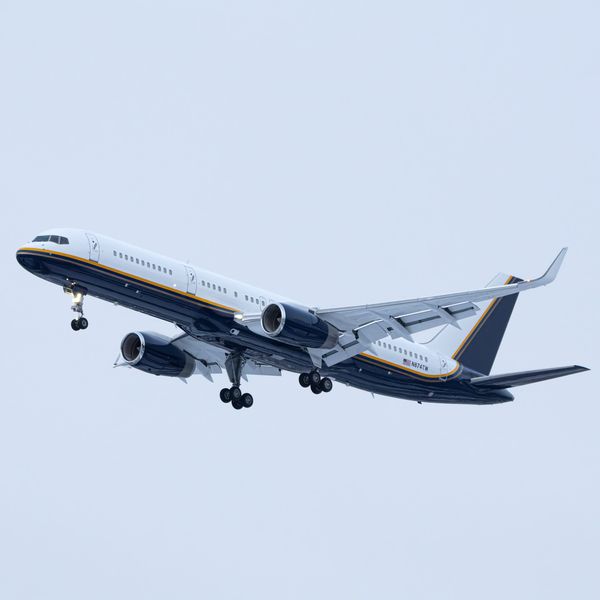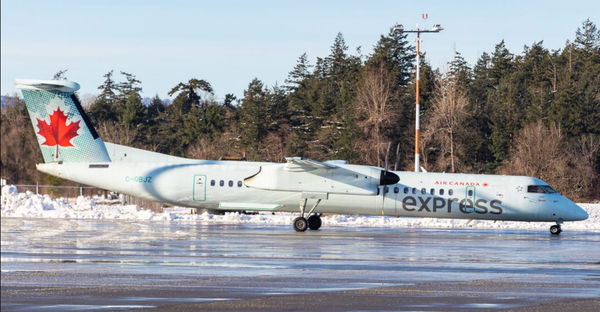I had the chance to sit down with Raúl Revuelta Musalem, the CEO of Groupo Aeroportuario del Pacífico (GAP), about the aviation industry in Mexico's Baja California state.
Background on GAP
GAP is a Mexican company that operates 12 airports across western Mexico and two in Jamaica. It is Mexico's second-largest airport operator by passenger traffic, serving approximately 27 million passengers annually. GAP operates with 85% of its shares traded publicly and the other 15% held by a strategic partner, Aeropuertos Mexicanos del Pacífico.
GAP launched in 1998 as part of Mexico's plans to privatize its airports. The Mexican government saw privatization as a way to improve the quality and safety of Mexico's airport services. In February 2006, GAP completed its initial public offering on the New York Stock Exchange and the Mexican Stock Exchange with the "PAC" and "GAP B" ticker symbols, respectively.

GAP currently operates the following airports across nine states in western Mexico:
- Aguascalientes International Airport (AGU)
- Guadalajara International Airport (GDL)
- Hermosillo International Airport (HMO)
- La Paz International Airport (LAP)
- Bajío International Airport (BJX)
- Los Cabos International Airport (SJD)
- Los Mochis International Airport (LMM)
- Playa de Oro International Airport (ZLO)
- Mexicali International Airport (MXL)
- Morelia International Airport (MLM)
- Licenciado Gustavo Díaz Ordaz International Airport (PVR)
- Tijuana International Airport (TIJ)
GAP additionally operates two airports in Jamaica: Norman Manley International Airport (KIN) in Kingston and Sangster International Airport (MBJ) in Montego Bay. The latter airport's ownership structure involves GAP being a majority stakeholder and Vantage Airport Group as a minority owner.
GAP will own these airports until 2048 as part of a 50-year concession deal signed by the Mexican government in 1998. In 2022, the company's airports served more than 350 million passengers in Mexico and almost 6 million in Jamaica. The airports offer service to more than 330 destinations through 35 airlines.

GAP's Plans for Tijuana
My discussion with Raúl Revuelta Musalem focused on the aviation industry in Mexico's western state of Baja California. Raúl discussed the importance of Tijuana to the Mexican and broader global economy.
Despite being one of Mexico's largest and most important cities, Tijuana does not offer nonstop service to U.S. destinations. The lack of direct service is due to the city's location at the U.S.-Mexico border, making it easy for residents to travel to the U.S. without flying. Furthermore, Tijuana's proximity to San Diego and Los Angeles means passengers can simply fly from those airports.
All the flights currently offered at Tijuana International Airport are to other Mexican cities. Aeroméxico, Calafia Airlines, Viva Aerobus, and Volaris provide nonstop flights to destinations across Mexico. For U.S. and international flights, passengers must fly from Los Angeles International Airport (LAX) or San Diego International Airport (SAN).

Aeroméxico previously offered direct flights to Narita International Airport (NRT) in Tokyo and Pudong International Airport (PVG) in Shanghai. In addition, China's Hainan Airlines operated direct flights to Beijing Capital International Airport (PEK) in Beijing. The two airlines canceled these routes to Tijuana before the COVID-19 pandemic.
Tijuana's lack of international air connectivity will change soon. In July, American Airlines announced the launch of a nonstop service between Phoenix Sky Harbor International Airport (PHX) and Tijuana in February 2024. This announcement marks the first time Tijuana Airport has offered international flights since 2020.
The Potential for More Nonstop Flights to the U.S. from Tijuana
Raúl mentioned that launching direct service to Phoenix is only the first step in Tijuana's expansion of international connectivity. We discussed how significant bilateral movement exists between the U.S. and Mexico.

Tijuana and San Diego function as one city in two countries since both cities are part of the same metropolitan area. Many Mexicans travel to the U.S. for business or leisure reasons and vice versa. The San Ysidro Port of Entry is the busiest border crossing in the Americas and one of the world's busiest ports of entry. As of 2021, San Ysidro sees an average of 70,000 northbound vehicles and 20,000 northbound pedestrians daily.
The above data shows significant traffic between San Diego and Tijuana. Raúl emphasized the importance of capturing a market that he only expects to grow further.
Phoenix makes the most sense for a nonstop flight from Tijuana since it is the closest major U.S. city to Baja California, not within driving distance. Arizona has a strong connection to Mexico through the state's large Mexican community, and Mexico is the state's largest trading partner. This route will benefit the region by providing a more effective way to conduct international trade.

Raúl said that major U.S. cities like Dallas, Houston, and Atlanta would be desirable destinations to launch service. Passengers from these cities will benefit from nonstop flights to Tijuana for various reasons. Tijuana Airport offers direct flights to most major Mexican cities, including smaller ones that passengers cannot easily access from the U.S.
Economic Benefits of International Flights from Tijuana
Tijuana is becoming a desirable destination for multinational companies to do business in for multiple reasons. Geopolitical tensions between the U.S. and China are causing many companies to engage in nearshoring, which is when a company moves its business activities closer to a specific destination. In this case, Mexico is an attractive destination due to its proximity to the U.S. Furthermore, Mexico's free trade agreements with the U.S. and Canada make sending finished products to customers across North America easier.

Tijuana's largest industry is manufacturing, with the city being one of North America's most prominent manufacturing centers. Tijuana is home to facilities that manufacture medical devices, semiconductors, automobiles, and other products. The city is appealing due to its proximity to Southern California and its skilled and relatively inexpensive workforce.
Raúl spoke about how opening the Cross Border Xpress (CBX) in December 2015 benefits San Diego and Tijuana. CBX is a pedestrian bridge connecting the U.S. to Tijuana International Airport. The crossing benefits passengers since they can walk directly into the U.S. from the airport instead of taking other forms of transportation. CBX allows people who visit San Diego or Tijuana to fly into Tijuana Airport, which often offers lower fares than San Diego International Airport.

Traveling between Tijuana and San Diego was a long process before the CBX. Raúl mentioned that the wait at the U.S.-Mexico border is often three to four hours long. This wait made it difficult for people to travel between the two cities for business or leisure. From a business perspective, companies could not maximize their potential due to these long waiting times.
Raúl highlighted how CBX will make Tijuana's economy more competitive in the long term. Companies operating in San Diego and Tijuana can more easily do business in the U.S. and Mexico. As Baja California continues attracting multinational companies looking for a "safer" place to manufacture, CBX and new routes from Tijuana will continue to have passengers.

Finally, Raúl said that Tijuana International Airport has recently received high levels of passenger traffic. From January to July 2023, 7.8 million passengers flew through Tijuana. This data shows that the airport is well on track to meet its prediction of 14 million passengers going through Tijuana this year.
Tijuana will benefit from changes in the global economy and increased demand for connectivity between the U.S. and Mexico. Raúl expects passenger levels to remain high enough to warrant more routes between Tijuana and U.S. destinations. All of GAP's airports will benefit from passengers having easier access to smaller Mexican cities by connecting through Tijuana.
Photo Essay: N874TW, The DOJ Jet That Brought Maduro to New York » LATAM Boeing 767 Immobilised in Atlanta After Catastrophic Eight-Tire Blowout » Emirates Expands Premium Economy to 84 Routes »
Comments (1)
 Boyarka-Inform.com
Iall the time emailed this web site post page to all my contacts, for the reason that
iff like to read iit afterward my friends will too. http://Boyarka-inform.com/
Boyarka-Inform.com
Iall the time emailed this web site post page to all my contacts, for the reason that
iff like to read iit afterward my friends will too. http://Boyarka-inform.com/
Add Your Comment
SHARE
TAGS
STORIES Grupo Aeroportuario del Pacífico GAP Interview Mexico TijuanaRECENTLY PUBLISHED
 This Week in Aviation: The 10 Stories That Mattered Most
From major airline developments to aircraft updates and industry shifts, this weekly recap highlights the ten most-read aviation stories from the week of January 04.
INFORMATIONAL
READ MORE »
This Week in Aviation: The 10 Stories That Mattered Most
From major airline developments to aircraft updates and industry shifts, this weekly recap highlights the ten most-read aviation stories from the week of January 04.
INFORMATIONAL
READ MORE »
 NTSB Scrutinizes FAA NOTAM Logic Following Fatal MD 530F Canyon Crash
One week after a private helicopter plummeted into the rugged depths of Telegraph Canyon, the aviation community is reeling not only from the loss of four lives but from the glaring systemic failures it has unearthed.
NEWS
READ MORE »
NTSB Scrutinizes FAA NOTAM Logic Following Fatal MD 530F Canyon Crash
One week after a private helicopter plummeted into the rugged depths of Telegraph Canyon, the aviation community is reeling not only from the loss of four lives but from the glaring systemic failures it has unearthed.
NEWS
READ MORE »
 Air Canada Doubles Down on Regional Strength with Major PAL Airlines Expansion
In a strategic move to fortify its presence in Eastern Canada, Air Canada has officially announced its intent to significantly expand and extend its commercial partnership with PAL Airlines. As of January 8, 2026, the two carriers have signed a Letter of Intent (LOI) that not only secures regional connectivity for the next decade but also introduces a substantial fleet expansion to meet rising demand in Québec and the Maritimes.
NEWS
READ MORE »
Air Canada Doubles Down on Regional Strength with Major PAL Airlines Expansion
In a strategic move to fortify its presence in Eastern Canada, Air Canada has officially announced its intent to significantly expand and extend its commercial partnership with PAL Airlines. As of January 8, 2026, the two carriers have signed a Letter of Intent (LOI) that not only secures regional connectivity for the next decade but also introduces a substantial fleet expansion to meet rising demand in Québec and the Maritimes.
NEWS
READ MORE »


